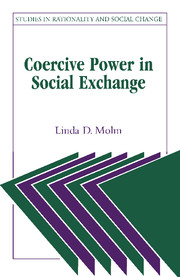Book contents
- Frontmatter
- Contents
- LIST OF FIGURES AND TABLES
- PREFACE AND ACKNOWLEDGMENTS
- 1 Introduction and overview
- 2 Social exchange and power
- 3 Punishment and coercion
- 4 An experimental setting for studying power in exchange relations
- 5 The early research: experimental tests and theoretical puzzles
- 6 The structural determination of power use
- 7 Dependence and risk: structural constraints on strategic power use
- 8 Injustice and risk: normative constraints on strategic power use
- 9 The effects of coercion: compliance or conflict?
- 10 A theory of coercion in social exchange
- 11 Conclusions and implications
- APPENDIX I Definitions of basic concepts of social exchange
- APPENDIX II The experimental instructions for the standardized setting
- REFERENCES
- NAME INDEX
- SUBJECT INDEX
8 - Injustice and risk: normative constraints on strategic power use
Published online by Cambridge University Press: 06 July 2010
- Frontmatter
- Contents
- LIST OF FIGURES AND TABLES
- PREFACE AND ACKNOWLEDGMENTS
- 1 Introduction and overview
- 2 Social exchange and power
- 3 Punishment and coercion
- 4 An experimental setting for studying power in exchange relations
- 5 The early research: experimental tests and theoretical puzzles
- 6 The structural determination of power use
- 7 Dependence and risk: structural constraints on strategic power use
- 8 Injustice and risk: normative constraints on strategic power use
- 9 The effects of coercion: compliance or conflict?
- 10 A theory of coercion in social exchange
- 11 Conclusions and implications
- APPENDIX I Definitions of basic concepts of social exchange
- APPENDIX II The experimental instructions for the standardized setting
- REFERENCES
- NAME INDEX
- SUBJECT INDEX
Summary
The classical exchange theorists (Blau 1964; Homans [1961] 1974; Thibaut and Kelley 1959) believed that social exchange is governed not only by the actual benefits actors obtain from one another, but by the expectations they bring to the relation as a result of past experiences or social norms. These expectations, like the status quo, provide a reference point for evaluating the rewards received from exchange. Rewards that either exceed or fall short of expectations produce emotional reactions, such as satisfaction or anger, and these emotions can influence behavior.
When expectations are based on social comparisons of some kind – what you receive in comparison to another person or reference group – questions of fairness or justice arise. Because such comparisons are an inevitable result of social exchange, power and justice are considered, by many, to be the two most important concepts of social exchange theory.
Nevertheless, the role of justice in the classical theories is something of an aberration. The concept of justice is found in neither of the root theories of social exchange (behavioral psychology or microeconomics), and its inclusion in exchange theory requires that we import concepts from other theories, either normative or cognitive. While Blau (1964) emphasized the former, contemporary justice theories tend to give more weight to the latter. Principles of justice have a normative base, but because perceptions of justice are in the eye of the beholder, they are subject to some of the same kinds of cognitive biases (e.g., loss aversion) discussed in the preceding chapter.
- Type
- Chapter
- Information
- Coercive Power in Social Exchange , pp. 190 - 218Publisher: Cambridge University PressPrint publication year: 1997



